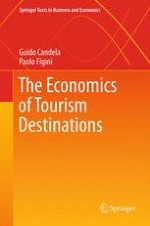2012 | OriginalPaper | Buchkapitel
3. The Tourism Sector in the Economy
verfasst von : Guido Candela, Paolo Figini
Erschienen in: The Economics of Tourism Destinations
Verlag: Springer Berlin Heidelberg
Aktivieren Sie unsere intelligente Suche, um passende Fachinhalte oder Patente zu finden.
Wählen Sie Textabschnitte aus um mit Künstlicher Intelligenz passenden Patente zu finden. powered by
Markieren Sie Textabschnitte, um KI-gestützt weitere passende Inhalte zu finden. powered by
